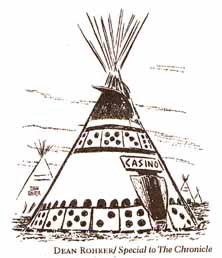It all started in 1978 when Congress proposed legislation that would give federally recognized tribes the right to conduct gambling on their reservations. Most tribal leaders were elated. They counted dollar signs in their dreams, even though a few straight thinkers warned them of trouble to come.
The legislation was gently-worded, but the devil was in the details. It was pointed out to tribal leaders that the legislation required that if a tribe wanted to operate games of chance, they would have to give up part of their sovereignty to the state wherein the gambling would take place. "No worries," said the tribal leaders. Another innocently-worded clause required them to negotiate a "compact," or a contract, that would control how they operated their "gaming," with that same state.
Again, "No worries," they said, as dollar signs flooded their minds. "We can take care of ourselves." Yeah, sure you can.


7 comments:
Writerfella here --
Cannot anyone who sees that the whole matter was a EuroMan trap, that what Native tribes had been 'given' by the US of A turns out to be an avenue for the Feds either to restrict or to reduce or to abrogate their responsibilities to Natives by treaties that earlier had been signed? Oh, sure, Native gaming laws are to benefit the various tribes that have undertaken such gaming. But the letter of the law has proven differently. Now we know where all of this has emerged, with modern attacks on tribes that comparably match those of the late 18th Century, which would mean that after 400 years, NOTHING has been changed! Can anyone having direct experience with such perfidy continue with a clear conscience? Unless they were being paid by whomever...
All Best
Russ Bates
'writerfella'
It's not to say that some people weren't counting dollar signs...it's only human to be a little greedy now and then...but I highly doubt ALL the Natives were doing that. Most were probably doing something along the lines of thinking, "Oh, thank goodness, now we have a fighting chance!"
I just saw a commercial on TV today about what Native American tribal sovereignty is, and how important it is.
Wish I had more information; this might be worth a seperate blog post.
As the article makes clear, gaming compacts are only the latest effort to reduce tribal sovereignty:
"The government has always prodded tribes to get on the road to termination. They did this because it has always been on their agenda. And we always knew it."
For more on the subject, see The Facts About Native Sovereignty.
Many tribes don't have a lot of options besides casinos. And it's not as if being poor is a shield against losing one's sovereignty. Before gaming, the feds often passed onerous laws, broke longstanding treaties, and terminated whole tribes.
History has shown that economic power is political power. Tribes are now winning court cases and elections they would have lost before. Gaming has put them on the playing field with state and local governments.
So tribes are in a tough spot. They can remain poor, hope for the best, and watch the feds trample their rights. Or they can pursue gaming, sign troublesome compacts, and use the earnings to fight for their rights.
Anyway, the way to battle such "perfidy" is by informing people it's happening. That's what we're doing at PECHANGA.net, a privately owned business not affiliated with any tribe. Indian leaders around the country start their day with us because they know information is the ultimate power.
Writerfella here --
And something else not ordinarily remembered, that the Bureau of Indian Affairs (originally called the Office of Indian Affairs) was chartered in 1824 to exist only for 25 years, since the prevailing wisdom was that 'the Indian problem' would be over and done with by such a length. Yet, the BIA, perhaps like the IRS, still very much is with us in the 21st Century, as is 'the Indian problem.' Ah, progress...
All Best
Russ Bates
'writerfella'
Re "Can anyone having direct experience with such perfidy continue with a clear conscience?" As I said, tribes face tough choices. But I doubt anyone would say sovereignty is weaker now than it was in the 1970s, before the Cabazon decision and the Indian Gaming Regulatory Act.
What's hurt tribal sovereignty isn't so much the recent gaming compacts as it is the conservative pressure from the feds, states, and courts. The solution to that is to elect progressive politicians who genuinely understand and support tribal sovereignty.
Post a Comment